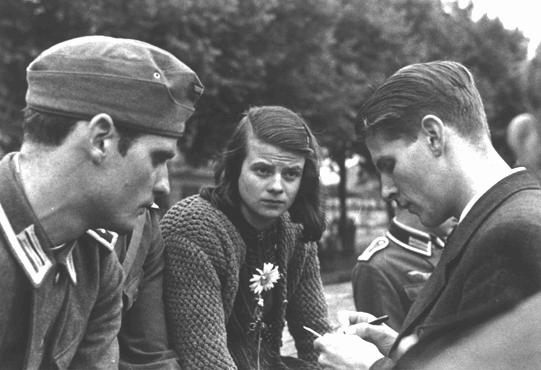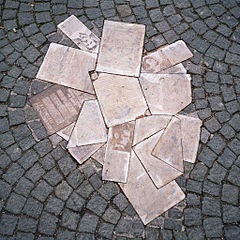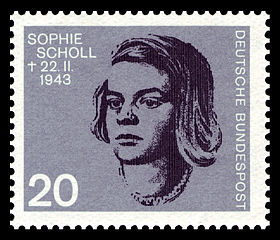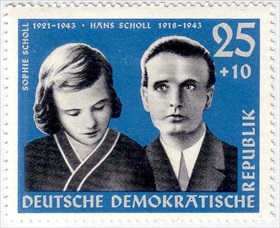WHITE ROSE SIBLINGS PUT TO DEATH
Munich, Germany • February 22, 1943
On this date in 1943 siblings Sophie (age 21) and Hans Scholl (24) and their friend Christoph Probst (24), members of the underground White Rose (Weisse Rose) resistance circle, were charged with sedition for writing, printing, and distributing anti-Nazi leaflets; “tried” by “Hitler’s Hanging Judge,” the notorious Nazi jurist Roland Freisler; and executed. (A year earlier Freisler, along with the malevolent likes of Reinhard Heydrich and Adolf Eichmann, had attended the Wannsee Conference in a Berlin suburb on scoping and implementing the “final solution” to the Jewish problem.) The White Rose was a nonviolent/intellectual resistance group of close-knit Munich university students and professors engaged in an anonymous leaflet campaign, lasting from mid-1942 until February 1943, that called for active opposition to Hitler’s totalitarian regime. Indeed, members of the White Rose are alleged to have carried out the earliest overt resistance to the Nazi regime.
The Scholl children, to the consternation of their parents, had originally been enthusiastic supporters of the German renewal promised by National Socialism, and they enrolled in the Hitler Youth organization. At 17 Hans Scholl commanded a company of 150 Hitler Youth (Hitlerjugend); 14-year-old Sophie was a member of the League of German Girls (Bund Deutscher Maedel). But as the young Scholls’ realization of Nazi atrocities directed against Jews on the Eastern Front grew, so did their moral outrage. Betrayed by a custodian, a loyal Nazi Party member, in the act of distributing their flyers in a building on the campus of the University of Munich (aka Ludwig Maximilian University of Munich) on February 18, 1943, the brother and sister were found guilty in Freisler’s People’s Court (Volksgerichthof) and beheaded on the same day, February 22, at Munich’s Stadelheim Prison. The younger Scholls were two of almost 16,000 people whom the Nazis guillotined. After their gruesome deaths, their sixth and last leaflet was smuggled to the Western Allies, who re-titled it “The Manifesto of the Students of Munich” and air-dropped millions of copies over Germany. Many of the Scholl sibling’s and Probst’s co-conspirators in the White Rose resistance movement were executed in the months that followed.
Members of the White Rose, especially the Scholls, became heroes in postwar Germany. One of Germany’s leading literary prizes is called the Scholl Siblings Prize (Geschwister-Scholl-Preis). Many local streets and squares in Germany have been named after the brother and sister. Geschwister-Scholl-Schule is the most common school name in Germany. In 2003 Germans were invited by a television broadcaster to choose the top ten most important Germans of all time. Voters under the age of 40 helped Hans and Sophie Scholl finish in fourth place, above Bach, Goethe, Gutenberg, Bismarck, and Einstein. If the votes of young viewers alone had been counted, the Scholls would have ranked first. Several years earlier, readers of a German women’s magazine voted Sophie Scholl “the greatest woman of the twentieth century.”
German White Rose Resistance Movement, 1942–1943
 |  |
Left: From left, Hans Scholl (1918–1943), Sophie Scholl (1921–1943), and Christoph Probst (1918–1943), Munich train station, July 23, 1942. As medical students at the University of Munich, Hans Scholl and Christoph Probst were awaiting transportation to the Eastern Front for required war service as medics (July–November). The two young men decried both the senseless shedding of blood by countless German soldiers on the battlefield, particularly after Stalingrad, and atrocities like the mass murder of Polish Jews in German concentration camps—“the most terrible crime against human dignity, a crime for which there is no comparison in the entire history of mankind,” they wrote in their second leaflet. Roland Freisler tried the two Scholls and Probst in his so-called People’s Court (aka Blood Court), which the Nazis set up outside constitutional authority. This court handled cases of political acts against the Hitler regime by conducting a series of show trials. Among the most notorious of the show trials was the trial of the July 20, 1944, bomb plotters who attempted to assassinate Hitler in his forward headquarters, Wolf’s Lair (Wolfsschanze), near Rastenburg, East Prussia (now part of Poland). On February 3, 1945, Freisler was killed when the Americans unloaded 2,264 tons of bombs on the Reich capital. The wife of German Gen. Alfred Jodl, Chief of the Operations Staff of the Armed Forces High Command, worked in the hospital that received Freisler’s crushed body. A worker commented, “It is God’s verdict.” Luise Jodl recalled their silent agreement: “Not one person said a word in reply.”
![]()
Right: The plaza in front of the main building of Ludwig Maximilian University of Munich is named “Geschwister-Scholl-Platz.” Facsimiles of the last White Rose flyer are set in the ground. All the passion expressed in the White Rose call-to-action flyers made little impression on the Scholls’ classmates at the time. Two hours after the Scholls’ and Probst’s execution, Munich students staged a pro-Nazi demonstration in front of the university. Three days later, at a special assembly, hundreds of students gave the custodian who betrayed the Scholls to the authorities a standing ovation.
 |  |
Left: Sophie Scholl on a 1964 West German postage stamp. By the time Sophie graduated from high school, the cheerful patriotism of her youth was replaced with heartache for the young people dying on the Eastern Front, fear for her family and friends, and contempt for the fascist police state that controlled every aspect of their lives. According to one account Sophie walked proudly to her death, and is said to have stated: “How can we expect righteousness to prevail when there is hardly anyone willing to give himself up individually to a righteous cause? . . . [But] what does my death matter if, through us, thousands of people are awakened and stirred to action?”
![]()
Right: Hans and Sophie Scholl on a 1961 East German postage stamp. Reputedly, the last words of Hans Scholl uttered en route to the execution chamber were “Long live freedom!” (“Es lebe die Freiheit”). Several versions of Sophie Scholl’s last words include “. . . your heads will fall as well” and “God, you are my refuge into eternity.”
Scenes from 2005 German Film Sophie Scholl–Die letzten Tage (Sophie Scholl: The Final Days) and 2005 Academy Award Nominee for Best Foreign Film
![]()

 History buffs, there is good news! The Daily Chronicles of World War II is now available as an ebook for $4.99 on Amazon.com. Containing a year’s worth of dated entries from this website, the ebook brings the story of this tumultuous era to life in a compelling, authoritative, and succinct manner. Featuring inventive navigation aids, the ebook enables readers to instantly move forward or backward by month and date to different dated entries. Simple and elegant! Click
History buffs, there is good news! The Daily Chronicles of World War II is now available as an ebook for $4.99 on Amazon.com. Containing a year’s worth of dated entries from this website, the ebook brings the story of this tumultuous era to life in a compelling, authoritative, and succinct manner. Featuring inventive navigation aids, the ebook enables readers to instantly move forward or backward by month and date to different dated entries. Simple and elegant! Click 











